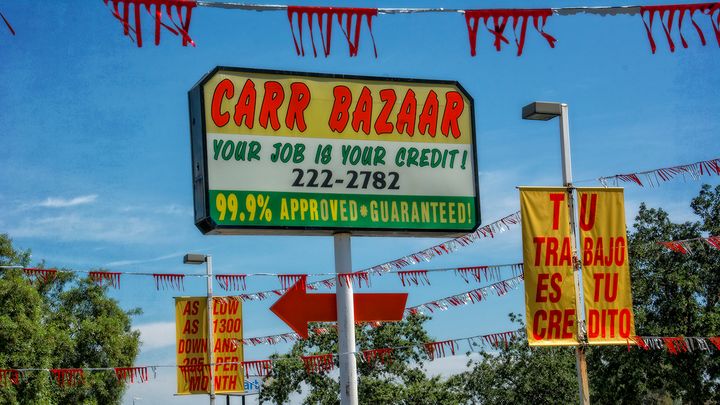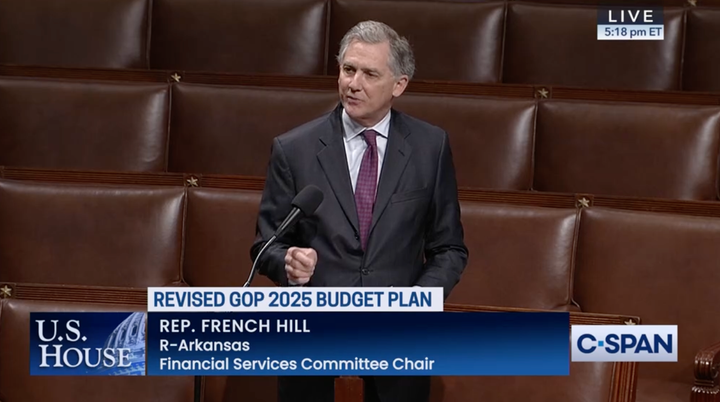The American Prospect is a nonprofit, independent magazine covering public policy and politics. Sludge is re-publishing this article.
A staff attorney, alleged to have manipulated evidence that led to the gutting of the Consumer Financial Protection Bureau’s payday lending rule, operated a business in Texas for three years whose model has been criticized as predatory, according to records obtained by a watchdog group.
Christopher G. Mufarrige procured a certificate of ownership for a business named CNJ Auto Finance in Houston, Texas, in 2008, and ran the business until 2011. Photos of the location taken at the time state that CNJ Auto Finance was a “Buy Here Pay Here” auto dealer. These businesses issue used car loans to customers with poor credit at high interest, and quickly repossess the vehicles in the event of default. The dealers often resell the same used car multiple times to different borrowers, similar to how payday lenders try to churn multiple loans out of one borrowing cycle.
Mufarrige and someone with the same surname owned separate Buy Here Pay Here shops at the same address; the apparent relative’s business lasted from 2012 to 2016, at which time the Texas Office of Consumer Credit Commissioner shut it down for operating without a license.
Mufarrige was the subject of a New York Times story last week involving a former CFPB economist’s memo, which alleged that several appointees used false statistics and gimmicks to downplay the value of payday lending regulations. The original rules, established under a previous regime, were targeted by Trump’s CFPB, under director Kathy Kraninger. Within days, Kraninger’s CFPB is expected to issue a revised version of the payday rule, which eliminates the key feature: It will not require payday lenders to assess their customers for the ability to repay their loans.
After leaving the CFPB last year, Mufarrige now works as an associate in the antitrust and competition practice at Wilson Sonsini, a D.C. law firm. Mufarrige received his bachelor’s degree in economics from Texas Christian University, the same state where CNJ Auto Finance was located.
Mufarrige declined to respond on the record to the Prospect. The CFPB did not answer a request for comment.
During the Trump administration, there have been numerous instances of appointees who had previously worked for the industries that they now purport to regulate. The Christopher G. Mufarrige situation appears to take such conflicts of interest to the extreme.
Derek Martin, director of Allied Progress, who obtained the information on Mufarrige, highlighted the Trump administration’s fealty to corporate interests, particularly in the high-cost lending space. “We knew predatory lenders bought considerable White House influence by shoveling millions of dollars into Donald Trump’s campaign chest and personal business,” Martin said. “We didn’t realize they also had a man on the inside sabotaging the conclusions of career bureau economists.”
IN ORDER TO FOLLOW STATUTES on administrative procedures, CFPB had to demonstrate that years of prior research that informed the original payday rule was wrong, and to establish an evidentiary basis for revising the rule. Individuals were brought in to guide that process toward the Trump administration’s intended conclusion, to strip the ability to pay provision.
Mufarrige was one of these people, brought in as an “attorney-advisor” to then-director Mick Mulvaney in October 2018. (Kraninger was confirmed that December.) Mufarrige spent over a year at the bureau, and the Times noted that he “had often criticized the 2017 rule as flawed and unnecessary.”
According to the memo from former CFPB economist Jonathan Lanning, Mufarrige had a “tenuous, often flawed grasp of economics.” He repeatedly attempted to “selectively cite evidence,” “advocate for conclusions based on presumptions,” and make “critical errors on basic economics.” The memo also alleges that Mufarrige was responsible for senior officials misrepresenting aspects of the payday rule’s evidence and analyses to the press. Lanning highlighted Muffarige’s contradictory assertions to justify certain conclusions, at one point asserting “default costs [on payday loans] are high,” and sentences later stating “default costs are low.”
Mufarrige “was fighting to have his name removed” from the list of employees who worked on the revised payday lending rule, a requirement under the Congressional Review Act. Some at the bureau thought that Mufarrige’s friendship with Ronald Mann, a professor who worked for a payday lending trade group, explained his reticence to being included on the list of contributors.
Lanning mused about Mufarrige’s motives that animated his attacks on the payday rule. “It seems like a really personal issue for him,” Lanning wrote in a comment attached to the memo.
He didn’t know how personal.
The payday lending rule also covers auto title loans, where an individual trades the title to their vehicle for quick cash. This differs from Buy Here Pay Here operations, where individuals purchase used vehicles at subprime interest rates. But both practices involve high-cost lending.
Consumer advocates have accused Buy Here Pay Here dealers of profiting off of vulnerable and desperate people. They target poor and vulnerable customers, buying lists of bankruptcy filers and sending them direct mail. Roughly one-quarter of Buy Here Pay Here customers go into default, according to the New Jersey attorney general’s office.
At the time that CNJ Auto Finance, the business attributed to Christopher G. Mufarrige, was active, Buy Here Pay Here outlets made $80 billion in loans annually, with more lots than new car dealerships.
CNJ ran into its share of legal issues. In August 2010, Mufarrige himself was sued by Houston’s 1st Choice Auto Auction, which alleged that he took possession of $194,000 in luxury vehicles without completing payment. CNJ “refused to return” or “pay for the vehicles,” a Bentley and four Mercedes, according to the complaint. The case was dismissed in March 2011 for unknown reasons.
The Klein Independent School District in Klein, Texas, also hit Mufarrige’s business with a lawsuit in 2013 over $2,926 in unpaid property taxes on a dealer inventory lot. That case was also dropped later in the year.
A second Buy Here Pay Here dealership named CAJ Auto Finance was located at the same address in Houston, attributed to a John Mufarrige, a relative of Christopher G. Mufarrige. A John Mufarrige shows up on LinkedIn as a 30-year-old computer science student at Lone Star College in Houston. John Mufarrige listed the same residential address in Spring, Texas, on his CAJ Auto Finance certificate of ownership as Christopher G. Mufarrige did for his certificate of ownership for CNJ Auto Finance.
CAJ Auto Finance’s business did not end well. It closed in June 2016, but in April of that year, the Texas Office of Consumer Credit Commissioner (OCCC) issued a cease and desist order against the company for “financing the sale of its vehicles without a license” for a number of years. CAJ had explained to the OCCC that it was no longer in business on two occasions, in December 2015 and January 2016, but the OCCC insisted that there was “reason to believe that it is still collecting on existing accounts.”
During the Trump administration, there have been numerous instances of appointees who had previously worked for the industries that they now purport to regulate. The Christopher G. Mufarrige situation appears to take such conflicts of interest to the extreme. Among other duties, he worked on signature rules on predatory lending, after spending a number of years operating a business whose model is thought by many as an example of predatory lending.
“The payday rulemaking process has truly been corrupted inside and out, leaving millions of Americans vulnerable to the payday loan debt trap,” Derek Martin of Allied Progress said. He urged Congress to take up bipartisan legislation introduced in Congress to cap consumer loan interest rates at an annual percentage yield of 36 percent.
UPDATE: A previous version of this article listed Mufarrige as a “political appointee.” That has a specific definition in Washington of someone appointed by the White House or an agency head. It’s not clear who precisely brought Mufarrige into CFPB, but he did not require Senate confirmation as some political appointees do. He was specifically an “attorney-advisor,” as the piece indicates, reporting to other appointees at CFPB. References to “political appointee” have been removed to avoid confusion.


